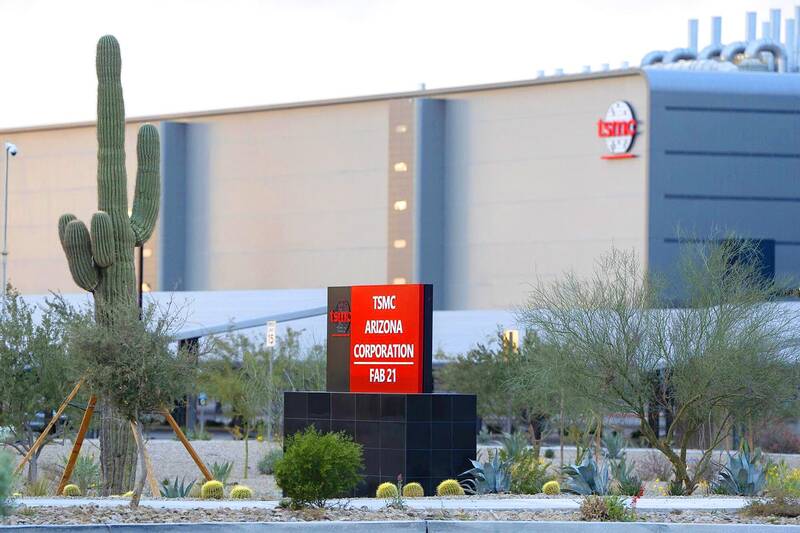Taiwan Semiconductor Manufacturing Co’s (TSMC, 台積電) new planned investment of US$100 billion in the US “doesn’t seem to make sense economically, but does have a strong political rationale,” a Heritage Foundation researcher said on Tuesday.
In an e-mail reply to a Central News Agency (CNA) inquiry, Michael Cunningham, a research fellow at the Heritage Foundation’s Asian Studies Center, said that with US President Donald Trump now threatening tariffs, many countries and companies, including Taiwan and TSMC, were trying to make the best of difficult times.
As to why TSMC, a private firm, would be motivated by a “strong political rationale,” Cunningham said that the company “faces tariff threats and is trying to do all it can to signal its commitment to the US and counter the narrative that its dominance in chip manufacturing harms US interests.”

Photo: Bloomberg
“TSMC and Taiwan are doing all they can to adjust to this new reality and show the Trump administration — and the American people — that they are actively contributing to US priorities,” he said.
TSMC, the world’s largest contract chipmaker, on Monday announced that it would invest an additional US$100 billion in Arizona over the next four years to set up three chip fabrication plants, two advanced packaging plants, and a research and development center.
TSMC has already committed to investing US$65 billion in Arizona to build three wafer fabs.
The first fab in Arizona has started production using the 4-nanometer process, while the second fab, which would be using the more sophisticated 3-nanometer, 2-nanometer and A16 processes, is under construction and is expected to begin production in 2028.
The third fab is expected to begin production by 2030 using 2-nanometer or more advanced processes, TSMC said in April last year.
Many analysts have raised concerns that much higher production costs in the US would erode TSMC’s profit margin and affect its cash dividend payout.
Cunningham cited Trump’s comments in a news conference with TSMC chairman C.C. Wei (魏哲家), in which the US president said chips made in Taiwan would eventually face tariffs.
It is possible that Trump would no longer be in office before the new investments start to roll out chips, so “it’s unclear how the announcement will have any impact on possible tariffs during Trump’s term unless some agreement was made as a condition of the investment, though I haven’t seen any reports of this being the case,” Cunningham said.
Thomas Shattuck, a senior program manager at the University of Pennsylvania’s Perry World House, told CNA in an e-mail response that TSMC’s new investment has been widely expected in the wake of Trump’s tariff threats.
“When Trump came into office, I emphasized the two things that Taiwan would need to do to lower the heat from Trump: a huge arms package request and more investment from TMSC,” Shattuck said.
The latest pledge simply signaled TSMC’s hopes to minimize the possibility of a tariff on Taiwanese chip manufacturing through more investments in the US, which has been the primary economic goal of the Trump administration, Shattuck said.
Cunningham said whether TSMC pledges more investments in the US or not, it is hard for Washington to stay out of any war involving Taiwan, while Shattuck said he did not see any direct connection between the investments and Trump’s decision to defend Taiwan.
“Obviously, more Taiwanese investment in the USA could help change Trump’s attitude towards Taiwan, but the full effect and connection will remain unknown until the time comes when such a decision would need to be made,” Shattuck said.

Taiwan’s exports soared 56 percent year-on-year to an all-time high of US$64.05 billion last month, propelled by surging global demand for artificial intelligence (AI), high-performance computing and cloud service infrastructure, the Ministry of Finance said yesterday. Department of Statistics Director-General Beatrice Tsai (蔡美娜) called the figure an unexpected upside surprise, citing a wave of technology orders from overseas customers alongside the usual year-end shopping season for technology products. Growth is likely to remain strong this month, she said, projecting a 40 percent to 45 percent expansion on an annual basis. The outperformance could prompt the Directorate-General of Budget, Accounting and

The demise of the coal industry left the US’ Appalachian region in tatters, with lost jobs, spoiled water and countless kilometers of abandoned underground mines. Now entrepreneurs are eyeing the rural region with ambitious visions to rebuild its economy by converting old mines into solar power systems and data centers that could help fuel the increasing power demands of the artificial intelligence (AI) boom. One such project is underway by a non-profit team calling itself Energy DELTA (Discovery, Education, Learning and Technology Accelerator) Lab, which is looking to develop energy sources on about 26,305 hectares of old coal land in

Netflix on Friday faced fierce criticism over its blockbuster deal to acquire Warner Bros Discovery. The streaming giant is already viewed as a pariah in some Hollywood circles, largely due to its reluctance to release content in theaters and its disruption of traditional industry practices. As Netflix emerged as the likely winning bidder for Warner Bros — the studio behind Casablanca, the Harry Potter movies and Friends — Hollywood’s elite launched an aggressive campaign against the acquisition. Titanic director James Cameron called the buyout a “disaster,” while a group of prominent producers are lobbying US Congress to oppose the deal,

Two Chinese chipmakers are attracting strong retail investor demand, buoyed by industry peer Moore Threads Technology Co’s (摩爾線程) stellar debut. The retail portion of MetaX Integrated Circuits (Shanghai) Co’s (上海沐曦) upcoming initial public offering (IPO) was 2,986 times oversubscribed on Friday, according to a filing. Meanwhile, Beijing Onmicro Electronics Co (北京昂瑞微), which makes radio frequency chips, was 2,899 times oversubscribed on Friday, its filing showed. The bids coincided with Moore Threads’ trading debut, which surged 425 percent on Friday after raising 8 billion yuan (US$1.13 billion) on bets that the company could emerge as a viable local competitor to Nvidia